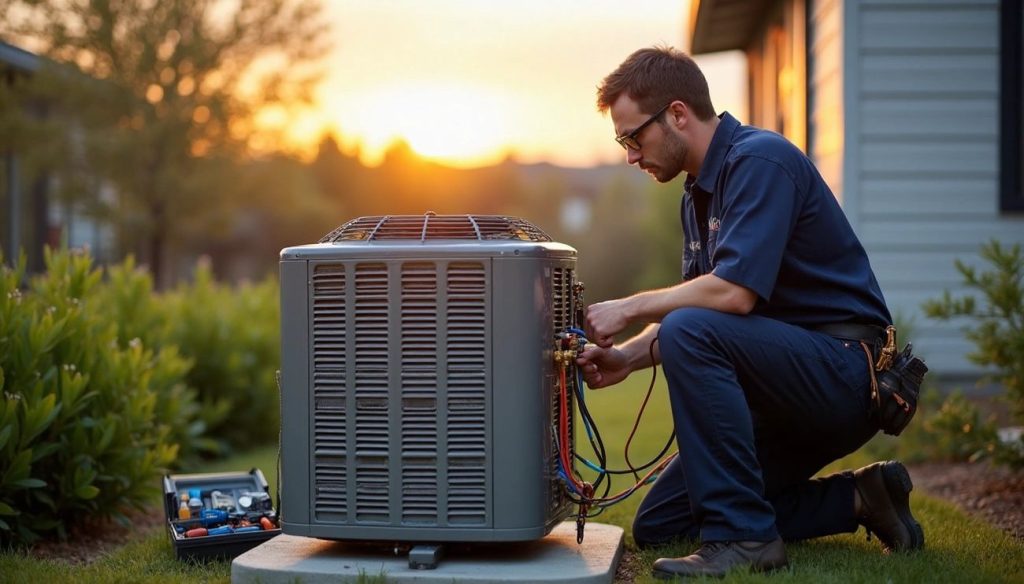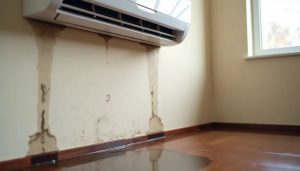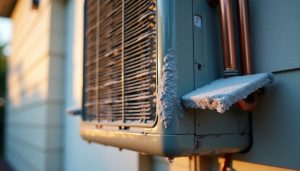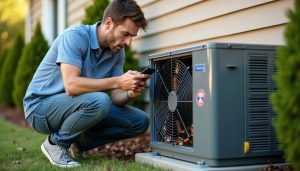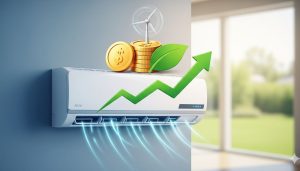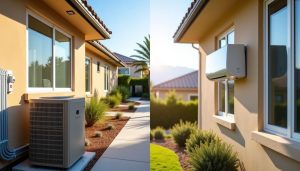Your heat pump system can run 25% more efficiently with regular heat pump tune-ups.
Most homeowners think annual service is enough. The truth is your heat pump needs maintenance twice every year to work at its best. Heat pumps differ from standard HVAC systems. They use the same parts for both heating and cooling, instead of having separate units. Just one season of use puts enough wear on your heat pump that it might not perform well next season.
Your system won’t just run better with regular maintenance – professionals can spot and fix small issues before they turn into expensive problems. The best time to schedule these tune-ups is right before heating and cooling seasons. This timing will give you a system that works perfectly when you need it.
This piece will show you everything about heat pump service – from how often you need it to what happens during maintenance visits. You’ll learn why missing these vital check-ups could cost you a lot more down the road. We’ll also give you some helpful DIY tips to keep your system running smoothly between professional visits.
How Often Should You Service a Heat Pump?
Heat pumps need more frequent care than traditional HVAC systems that only need yearly check-ups. Your heat pump works non-stop throughout the year to handle both heating and cooling, which naturally causes more wear and tear.
Why twice a year is the standard
Heat pumps must be serviced twice yearly since they work as both heating and cooling systems. The system’s components face more strain than single-function systems because they run continuously.
Your heat pump works harder year-round without any breaks that separate systems get. The system keeps running instead of taking seasonal breaks while another system takes over, which puts extra strain on the equipment.
On top of that, professional maintenance keeps your warranty valid, since many manufacturers just need regular service to maintain coverage. The system’s critical parts wear out faster without proper care, and this reduces its efficiency and reliability as time goes on.
Spring and fall: the ideal times
Spring and fall are the best times to schedule maintenance from both practical and technical points of view. These seasons come right before peak usage times:
- Spring maintenance: Gets your system ready to cool after winter heating
- Fall maintenance: Prepares your heat pump to heat after summer cooling
The timing makes sense—technicians can get your heat pump ready for what’s coming next. HVAC contractors also have more open schedules during these slower periods, so it’s easier to book appointments.
What happens if you skip a season
Skipping regular maintenance might seem fine at first, but problems stack up fast. Research shows that all but one of these repairs happen in systems that missed their regular tune-ups.
Missing maintenance causes:
- Lower energy efficiency (up to 5% drops each time you skip)
- Higher power bills as the system struggles to keep up
- More chances of sudden breakdowns when weather gets rough
- Shorter system life (10 years without maintenance vs 15+ years with regular care)
Regular check-ups help catch small problems before they turn into expensive repairs. The small cost of twice-yearly service pays off through lower energy bills, fewer repairs, and a system that lasts much longer.
What Happens During Professional Heat Pump Maintenance
Professional heat pump maintenance visits go beyond a simple inspection. These service appointments include a detailed series of tasks that will give a well-running system at peak efficiency.
Filter and coil cleaning
Your technician begins by checking the air filter for dirt that can strain the compressor and other components. A clean filter will give a proper airflow and stops dirt from circulating in your home. The next step involves cleaning both indoor and outdoor coils. Dirty coils reduce your heat pump’s cooling ability by a lot. This shortens system lifespan and drives up energy costs. The professionals use specialized tools and cleaning products made specifically for heat pump coils.
Refrigerant level checks
Technicians measure refrigerant charge levels during maintenance. They identify and seal any leaks if the system needs more refrigerant, then recharge it. They test the discharge line (which should be 100°-110° over outdoor ambient temperature) and suction line (which should be 5°-15° cooler than outdoor temperature) to verify proper operation.
Thermostat calibration
The technician tests your thermostat’s functionality and accuracy in reading your home’s temperature. This process includes comparing the thermostat’s displayed temperature with an accurate thermometer reading to make needed adjustments. Proper calibration is vital since an inaccurate thermostat guides you toward energy waste and uncomfortable living spaces.
Electrical and motor inspections
The inspection covers all electrical connections with tightening and cleaning as needed. Technicians verify secure physical connections, look for bulging or unusual markings on the run capacitor, and lubricate motors and moving parts to cut down friction. This preventive approach helps avoid electrical failures.
Performance testing and tune-up
Performance testing wraps up the maintenance visit. The technician tests the defrost cycle, checks the auxiliary heat system, and confirms proper operation in all modes. These steps verify that your heat pump delivers the best heating and cooling performance. You’ll receive a written summary of completed inspections with results and recommendations.
Why Regular Maintenance Matters
Your heat pump’s regular maintenance brings benefits that go way beyond the reach and influence of just keeping your system operational. Professional service visits create multiple advantages that ripple through your home’s comfort system.
Improved energy efficiency
Heat pumps that receive proper maintenance run up to 15% more efficiently compared to neglected systems. Your system’s motors and compressors work better when filters and coils stay clean, which allows smooth airflow. A well-maintained system uses 31-47% less energy on average. These savings show up directly in your monthly utility bills.
Lower risk of breakdowns
Research shows that all but one of these repairs happen in heat pumps that lack regular maintenance. Technicians can spot potential problems early during routine checkups, which stops minor issues from becoming major failures. This all-encompassing approach reduces emergency repair costs and system downtime.
Longer system lifespan
Your heat pump should last 15 years, but this lifespan drops significantly without proper care. Regular professional service adds about 30% more life to your equipment. This protects your investment by reducing wear on crucial components.
Warranty compliance
You need documented professional maintenance to keep your manufacturer’s warranty valid. Without proper service records, manufacturers might reject warranty claims for refrigerant leaks, compressor failures, or coil problems. These repairs can get pricey if you become responsible for them.
Better indoor air quality
Clean filters and coils remove dust, allergens, and pollutants from your home effectively. Your properly maintained heat pump circulates air constantly, which eliminates stagnant air and keeps indoor temperatures steady. This combination of circulation and efficient filtration creates a healthier environment in your home.
DIY Heat Pump Maintenance Tips Between Visits
Your heat pump runs better when you perform simple DIY tasks between professional maintenance visits. These maintenance steps help maintain optimal performance until your next scheduled service.
How often to change air filters
Clean filters play a crucial role in your system’s performance. You should check filters monthly and replace them every 1-3 months. Several factors determine how often you need to change filters:
- Filter thickness affects longevity – thicker filters last 6-12 months, while 1-inch filters need more frequent changes
- Your home’s conditions matter – pets, dust levels, and number of occupants impact filter life
- Usage patterns make a difference – filters need more frequent changes during heavy use periods
Most experts suggest changing heat pump filters at least twice yearly.
Clearing debris from outdoor unit
Your outdoor unit needs protection from leaves, twigs, and other debris. Keep vegetation trimmed back at least 18 inches on all sides. Clean the unit with a soft brush and rinse it gently with low-pressure water. High-pressure cleaning can damage the delicate fins, so avoid it.
Checking thermostat settings
Make sure your thermostat responds accurately to temperature changes. Programmable thermostats need occasional maintenance – remove the front cover and clean accumulated dust with a soft brush. Smart thermostats only need light dusting of the screen.
Listening for unusual noises
Unusual sounds signal problems that need attention. Loose parts usually cause rattling, while grinding, hissing, or screeching indicates serious issues. Quick action on strange noises prevents repairs from getting pricey.
Conclusion
Your heat pump’s regular maintenance is the life-blood of a reliable home comfort system. Professional service twice a year is not optional but necessary. Heat pumps work non-stop throughout the year. They handle both heating and cooling without seasonal breaks and just need more care than traditional HVAC systems.
Professional maintenance in spring and fall helps your system switch smoothly between seasons. Complete service visits check everything from filter replacements to refrigerant levels. These routine tune-ups give real benefits – up to 25% better efficiency, lower breakdown risk, and a system that lasts 30% longer.
Simple DIY maintenance between professional visits keeps your system running at its best. Tasks like changing filters, removing debris from outdoor units, and checking for strange noises can stop small issues from becoming big problems.
Your decision to skip regular maintenance might save money now but will cost you much more over time. High energy bills, surprise repairs, and early system replacement cost nowhere near the small investment in professional service. Your heat pump is a big investment in your home’s comfort. Protecting this investment through proper care makes perfect sense.
The maintenance schedule in this piece will give you steady comfort, lower utility bills, and a heat pump that works well for years. Taking care of your system today will without doubt improve its efficiency and reliability tomorrow.
FAQs
Q1. How often should I schedule professional maintenance for my heat pump? It’s recommended to have your heat pump professionally serviced twice a year, typically in spring and fall. This ensures optimal performance for both heating and cooling seasons.
Q2. What are the benefits of regular heat pump maintenance? Regular maintenance improves energy efficiency, lowers the risk of breakdowns, extends system lifespan, ensures warranty compliance, and enhances indoor air quality.
Q3. What happens during a professional heat pump maintenance visit? Technicians clean filters and coils, check refrigerant levels, calibrate the thermostat, inspect electrical components and motors, and perform comprehensive performance testing.
Q4. Can I perform any maintenance tasks on my heat pump between professional visits? Yes, you can change air filters regularly, clear debris from the outdoor unit, check thermostat settings, and listen for unusual noises. However, leave complex tasks to professionals.
Q5. What are the consequences of skipping heat pump maintenance? Skipping maintenance can lead to decreased energy efficiency, higher utility bills, increased risk of unexpected breakdowns, and a shortened system lifespan. It may also void your warranty.
References
[1] – https://quality-hc.com/blog/heat-pumps-annual-maintenance/
[2] – https://www.edsheatingandcooling.com/blog/how-often-do-heat-pumps-need-to-be-serviced-essential-maintenance-guide/
[3] – https://gacservices.com/blog/time-schedule-heat-pump-tune-up/
[4] – https://www.pdsplumbingandair.com/how-often-to-service-heat-pump/
[5] – https://aquariushomeservices.com/blog/does-a-heat-pump-need-maintenance-twice-a-year/
[6] – https://www.meyersheatingac.com/blog/heat-pump-service/why-heat-pumps-require-twice-a-year-maintenance/
[7] – https://www.bennerandco.com/blog/heat-pump-service/how-often-does-a-heat-pump-need-service/
[8] – https://www.robbinsheating.com/blog/air-conditioning-service/does-your-heat-pump-need-spring-maintenance-yes/
[9] – https://www.johnsair.com/blogs/why-skipping-heat-pump-maintenance-can-lead-to-expensive-repairs/
[10] – https://residential.sunsetair.com/blog/why-does-my-heat-pump-need-twice-a-year-maintenance/
[11] – https://www.holycityhvac.com/blog/the-scary-consequences-of-skipping-heat-pump-maintenance
[12] – https://skyheating.com/blog/ultimate-heat-pump-maintenance-checklist/
[13] – https://www.hvac.com/expert-advice/heat-pump-maintenance-checklist/
[14] – https://www.logan-inc.com/blog/clean-heat-pump-evaporator-coil/
[15] – https://www.energy.gov/energysaver/operating-and-maintaining-your-heat-pump
[16] – https://cielowigle.com/blog/hvac-inspection/
[17] – https://www.ac-heatingconnect.com/contractors/checking-charge-heat-pump-winter/
[18] – https://www.hvac.com/expert-advice/how-to-calibrate-a-thermostat/
[19] – https://www.legacyheating.ca/guide-to-thermostat-calibration/
[20] – https://www.carrier.com/residential/en/us/products/heat-pumps/heat-pump-service/
[21] – https://www.achrnews.com/articles/164492-the-importance-of-regular-heat-pump-maintenance
[22] – https://www.nrel.gov/news/detail/press/2024/benefits-of-heat-pumps-detailed-in-new-nrel-report
[23] – https://www.gentryservice.com/blog/ways-extend-lifespan-heat-pump
[24] – https://www.acbyluquire.com/blog/hvac-warranty-compliance-matters
[25] – https://www.americanstandardair.com/resources/warranty-and-registration/
[26] – https://www.supremeservicetoday.com/blog/the-connection-between-heat-pump-maintenance-and-indoor-air-quality/
[27] – https://www.greenhomeheatpumps.co.uk/the-effect-of-heat-pumps-on-indoor-air-quality
[28] – https://www.hvac.com/expert-advice/often-change-air-filters-air-conditioner-system/
[29] – https://www.advantageairmechanical.com/blog/how-often-should-change-home-air-filters
[30] – https://alturascontractors.com/guide-to-heat-pump-cleaning/

